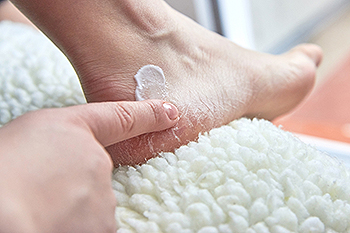About one-fifth of adults in the United States experience cracked heels, studies show. Besides being unsightly, cracked heels that deepen can also become painful and lead to bleeding. Because there are no oil glands on the feet, they often become dried out. In addition, medical conditions such as diabetes, psoriasis and eczema can promote cracked heels. One of the simplest remedies for cracked heels is a petroleum jelly treatment. It helps reduce moisture loss from the skin and keeps it hydrated. Soak your feet in warm water for about 15 minutes, and then use a pumice stone to scrub off the dried skin. Rinse and pat dry thoroughly. Next, apply moisture lotion to the affected area and cover that with petroleum jelly to seal it in. Put on a pair of wool socks overnight and wash your feet again the next morning. If cracked heels continue to give you problems, it is suggested that you visit a podiatrist who can recommend further treatment options.
Cracked heels are unsightly and can cause further damage to your shoes and feet. If you have any concerns, contact Donald Manger, DPM from Associated Podiatric Physicians, PA. Our doctor can provide the care you need to keep you pain-free and on your feet.
Cracked Heels
Cracked heels appear unappealing and can make it harder for you walk around in sandals. Aside from looking unpleasant, cracked heels can also tear stockings, socks, and wear out your shoes. There are several methods to help restore a cracked heel and prevent further damage.
How Do You Get Them?
Dry skin is the number one culprit in creating cracked heels. Many athletes, walkers, joggers, and even swimmers suffer from cracked heels. Age and skin oil production play a role to getting cracked heels as well.
Promote Healing
Over the counter medicines can help, especially for those that need instant relief or who suffer from chronic dry feet.
Wear Socks – Wearing socks with medicated creams helps lock in moisture.
Moisturizers – Applying both day and night will help alleviate dryness which causes cracking.
Pumice Stones – These exfoliate and remove dead skin, which allows for smoother moisturizer application and better absorption into the skin.
Change in Diet
Eating healthy with a well-balanced diet will give the skin a fresh and radiant look. Your body responds to the kinds of food you ingest. Omega-3 fatty acids and zinc supplements can also revitalize skin tissue.
Most importantly, seek professional help if unsure how to proceed in treating cracked heels. A podiatrist will help you with any questions or information needed.
If you have any questions, please feel free to contact our office located in Hamilton Township, NJ . We offer the newest diagnostic and treatment technologies for all your foot care needs.

